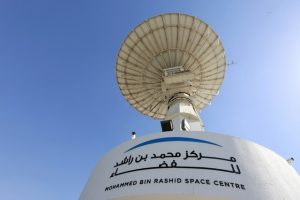
The Sustainable Energy Programme Section team at Mohammed bin Rashid Space Centre held a workshop entitled, “New Engineering and Smart Technologies Shaping Future Cities,” at the first edition of The Future Cities Show 2017, held from April 2-4, 2017. During the workshop, the team briefed participants on the engineering practices and technologies deployed in the Sustainable Autonomous House. This project aims to decrease energy consumption, reduce carbon emissions and use smart technologies so as to ensure the protection of the environment and healthy living conditions.
Engineer Abdulla Ahli, Manager of the Sustainable Energy Programme Section at MBRSC, emphasized that the Sustainable Autonomous House introduces a new concept for sustainable houses for future cities. The house adopts standards related to sustainability and environmental protection. Additionally, it provides a new model in terms of insulation system, a smart management and control system, as well as mechanical techniques for air filtration.
Building this house falls in line with national strategies and plans aiming at effectuating the use of the green and smart techniques.
Ahli said that it is not only technical specifications and engineering design that make MBRSC’s Sustainable Autonomous House unique, but also meeting environmental and comfortable living requirements, including thermal comfort, a stabilized temperature ranging from between 22°C to 25°C in all seasons and times, controlled humidity level, good air flow, luminosity, noise reduction, in addition to preventing condensation, mold growth, dust and germs.
He also stressed that adopting this new model of sustainable will dramatically help reduce the carbon footprint.
Engineer Mohammad Bin Nashooq, Senior Engineer, Sustainable Energy Programmes Section at MBRSC, added that the smart technical and engineering solutions applied in the house, i.e. a cooling system based on chilled water, thermal and air insulation techniques in both directions, as well as a mechanical ventilation system, allow for energy savings of 75% compared to typical houses that use conventional air conditioning. Also, the house includes a smart management and control system which interacts with external heat and humidity changes.
“All materials used in the house are composed of several layers of eco-friendly processed wood,” bin Nashooq explained. Relying only on solar energy, the house is energy self-sufficient and independent of the electricity grid. It can also act as “small power plant” producing power from solar energy.
In another context, Eng. Shaikha Al Falasi, Engineer, Sustainable Energy Programmes Section at MBRSC, said that the house features insulating walls, roofing and flooring that prevent heat absorption, avoiding the use of heat-conductive material in the windows, bridges and steel columns that absorb heat or leak energy.
Commenting on the window glass, Al Falasi said that it is composed of three layers (triple glazed), and contains krypton gas to enhance the effectiveness of the insulation. Furthermore, Alfalasi said that the orientation of the building fits with the Sun’s path to ensure optimal performance of solar cells on its top.
MBRSC’s Sustainable Autonomous House is certified by the Passive House Institute in Germany as the first of its kind Passive House for a hot and humid climate. MBRSC launched this project as part of its research efforts in sustainability and green buildings. The house uses energy production and storing technologies similar to those used in building satellites and space shuttles.
Original published at: https://spacewatch.global/2017/04/uaes-mbrsc-holds-workshop-future-technologies-smart-cities/
 SpaceWatch.Global An independent perspective on space
SpaceWatch.Global An independent perspective on space

